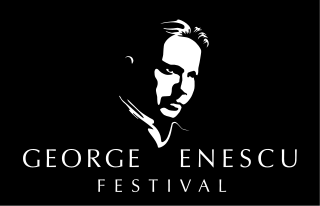Related Research Articles
Constantin-Nicolae Silvestri was a Romanian conductor and composer.

George Enescu, known in France as Georges Enesco, was a Romanian composer, violinist, pianist, conductor, and teacher and is regarded as one of the greatest musicians in Romanian history.

Wilhelm Georg Berger was a Romanian composer, musicologist, violist and conductor.

Symphony No. 1, Op. 13, in E♭ by the Romanian composer George Enescu reflects the composer's training in both Vienna and Paris. In the former location he studied the Brahmsian tradition with Robert Fuchs, and in the latter the French tradition with Jules Massenet and Gabriel Fauré.
Anatol Vieru was a Romanian music theoretician, pedagogue, and composer. A pupil of Aram Khachaturian, he composed seven symphonies, eight string quartets, concertos, and chamber music. He also wrote three operas: Iona (1976), Praznicul Calicilor (1981), and Telegrame, Temă și Variațiuni (1983). He was awarded the Herder Prize in 1986.
Pascal Bentoiu was a Romanian modernist composer.

The George Enescu Festival, held in honor of the celebrated Romanian composer George Enescu, is the biggest classical music festival and classical international competition held in Romania and one of the biggest in Eastern Europe. The festival proposal was authored by Andrei Tudor in 1955. Enescu's close associate George Georgescu organized the first festival in 1958; highlights included a performance of Bach's Concerto for Two Violins with Yehudi Menuhin and David Oistrakh as soloists and a staging of Enescu's sole opera, Œdipe, with Constantin Silvestri conducting.
Liviu Comes was a Romanian composer and musicologist.
Valentin Gheorghiu was a Romanian classical pianist and composer. He is regarded as a leading Romanian pianist of the twentieth century, focused on both piano concertos of the Romantic period and chamber music. He won the prize for the best performance of Enescu's Violin Sonata No. 3 at the first George Enescu International Competition in 1958, with his brother Ștefan as the violinist. He made recordings with international orchestras and conductors.

Liana Alexandra Septefrati was a Romanian composer, pianist and music educator.

Carmen Petra Basacopol was a Romanian composer, pianist, musicologist and academic teacher. She taught at the National University of Music Bucharest, between 1962 and 2003, and at the Rabat Conservatoire in Morocco in the 1970s. As a musicologist, she achieved a PhD from the Sorbonne University in Paris in 1976, with a dissertation about three Romanian composers who had influenced her, George Enescu, Mihail Jora and Paul Constantinescu, composers representing essential features of Romanian music.
Tiberiu Olah was a Romanian composer, teacher, and musicologist of Hungarian ethnicity.

Tudor Ciortea was a Romanian composer, musicologist, and music educator.

Emil Simon was a Romanian conductor and composer.

Symphony No. 2, Op. 17, in A major by the Romanian composer George Enescu was written in 1912–14. A performance lasts about 55 minutes.

The Symphony No. 3, Op. 21, in C major is a large-scale orchestral-vocal composition by the Romanian composer George Enescu. While it was first written in 1916–18. the composer revised it numerous times over the following decades.

The Symphony No. 4 in E minor is an orchestral composition by the Romanian composer George Enescu, left incomplete at the composer's death, but finished in 1996 by Pascal Bentoiu.

Sigismund Toduță was a Romanian composer, musicologist, and professor.

Cornel Țăranu was a Romanian classical composer, musicologist, conductor and cultural manager. A native of Cluj-Napoca in Transylvania, he was always attached to this region, and contributed to cultural cooperation between Romanian and ethnic Hungarian musicians. He studied locally, at the Cluj Academy, assimilating the local avatar of neoclassicism, alongside influences from Romanian folk music—though his debut years also evidenced conformity with Socialist Realism, he was reportedly censured by the communist regime for keeping company with sidelined figures, such as the poet Lucian Blaga. A teacher at his alma mater, he furthered his studies abroad, at the Conservatoire de Paris, becoming an authority on, and posthumous disciple of, George Enescu. Braving controversy, he worked on completing unfinished scores by Enescu, including his Fifth Symphony and a musical poem, Strigoii. In parallel, he founded Cluj's Ars Nova, a chamber orchestra dedicated to contemporary classical music and performance art.
References
- ↑ "Famous Birthdays on 13th June". OnThisDay.com. Retrieved 6 February 2016.
- ↑ Warwick Bardon Henshaw. "Biographical Dictionary of the Organ" . Retrieved 6 February 2016.
- ↑ "433.ro – Muzica clasica, Muzica contemporana – 433. Refugiu. Experimental – Christian Wilhelm Berger". Archived from the original on 16 February 2017. Retrieved 6 February 2016.
- ↑ "UNMB" . Retrieved 6 February 2016.
- ↑ "Klassika: Christian Wilhelm Berger (Geb. 1964): Werkverzeichnis".